The Movie Book (Big Ideas Simply Explained) (2016)

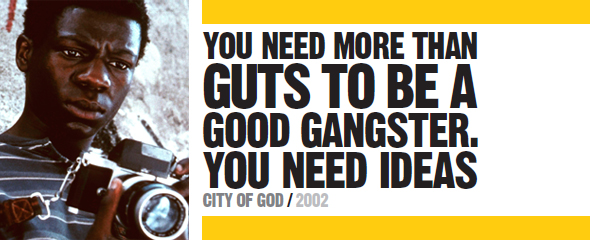
IN CONTEXT
GENRE
Gangster, crime
DIRECTOR
Fernando Meirelles
WRITERS
Bráulio Mantovani (screenplay); Paulo Lins (novel)
STARS
Alexandre Rodrigues, Leandro Firmino, Alice Braga
BEFORE
1990 Martin Scorcese’s Goodfellas tells the story of the Mafia from the point of view of mobster-turned-informant Henry Hill.
AFTER
2005 Meirelles’s Hollywood debut, The Constant Gardener, is a love story set in Kenya.
2008 Blindness, Meirelles’s movie about an epidemic of blindness in an unnamed city, receives mixed reviews.
Stylish, compelling, and hugely entertaining, Fernando Meirelles’ City of God (Cidade de Deus) also has a serious point to make. Told from the perspective of Rocket (Alexandre Rodrigues), an aspiring photographer, it is a movie about one of Brazil’s most notorious and impoverished favelas, the Cidade de Deus in Rio de Janeiro, and how organized crime there corrupted, and, in many cases, destroyed its local youth. Yet Meirelles does not lecture his audience. Instead, he uses every stylistic trick in the cinematic book, from inventive montages to adventurous camera work, to ensure the story is vividly and energetically realized, and engages the audience with the human tragedy.
In one scene, a gang of children walks through the favela, joking about taking over the slum and the people they would need to kill in the process. It is darkly humorous but also horrifying to see children bred into violence from so young an age.
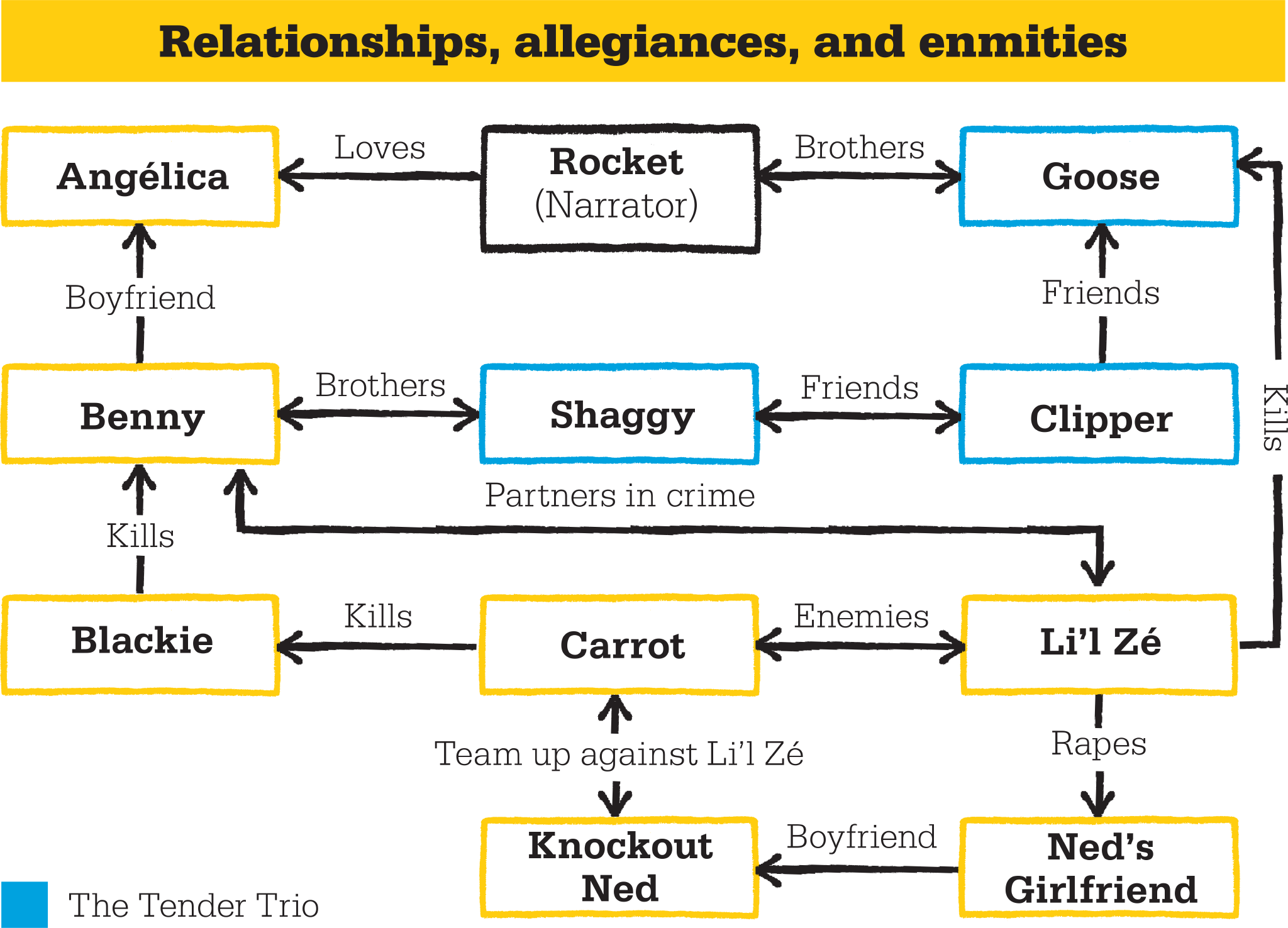
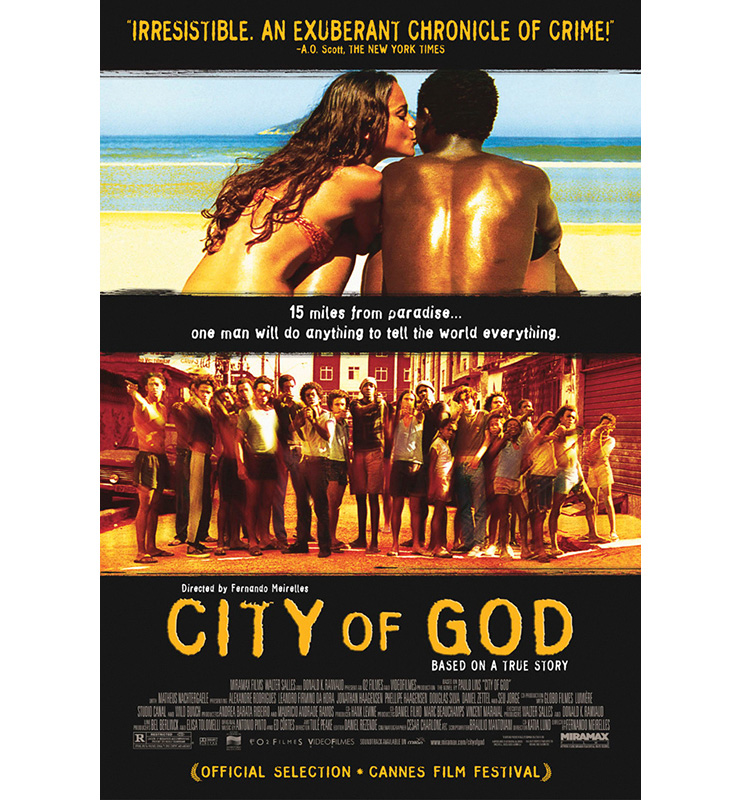
Most of the movie’s actors were inhabitants of the favelas portrayed in the movie. Several went on to appear in Meirelles’ sequel, City of Men.

Tale of a city
The movie’s action is played out at an ambitious scale. Its story spans more than a decade and charts the experience of growing to adulthood in the City of God. To achieve this, Meirelles did not bind himself to the narrative constraints of one person’s story. The movie does have a central character in Rocket, but he is a photographer, an observer who acts as an audience surrogate, involved but not involved, there to witness the events in the City of God as they occur. The movie clarifies this intention with its use of voice-over, as Rocket summarizes the favela’s defining moments, from the downfall of the Tender Trio in the late 1960s, to the rise of Li’l Zé as a gang leader in the early 1980s. Rocket observes everything as characters flourish and die, as high-rise buildings rise and cartels fall.
The use of voice-over also allows for bolder visual techniques, such as montages that enable a faster passage of time, as well as the opportunity for more stylistic experimentation. The movie shifts its focus from one central protagonist to another, taking turns telling their stories. It takes up the tales of Shaggy, the leader of the Tender Trio, Benny, the pacifist friend of Li’l Zé, and Knockout Ned, a working man dragged into gang warfare after his family is attacked. With these switching perspectives, Meirelles turns the favela itself into the central character, with other characters entering only when they matter to the overall story of the slum.
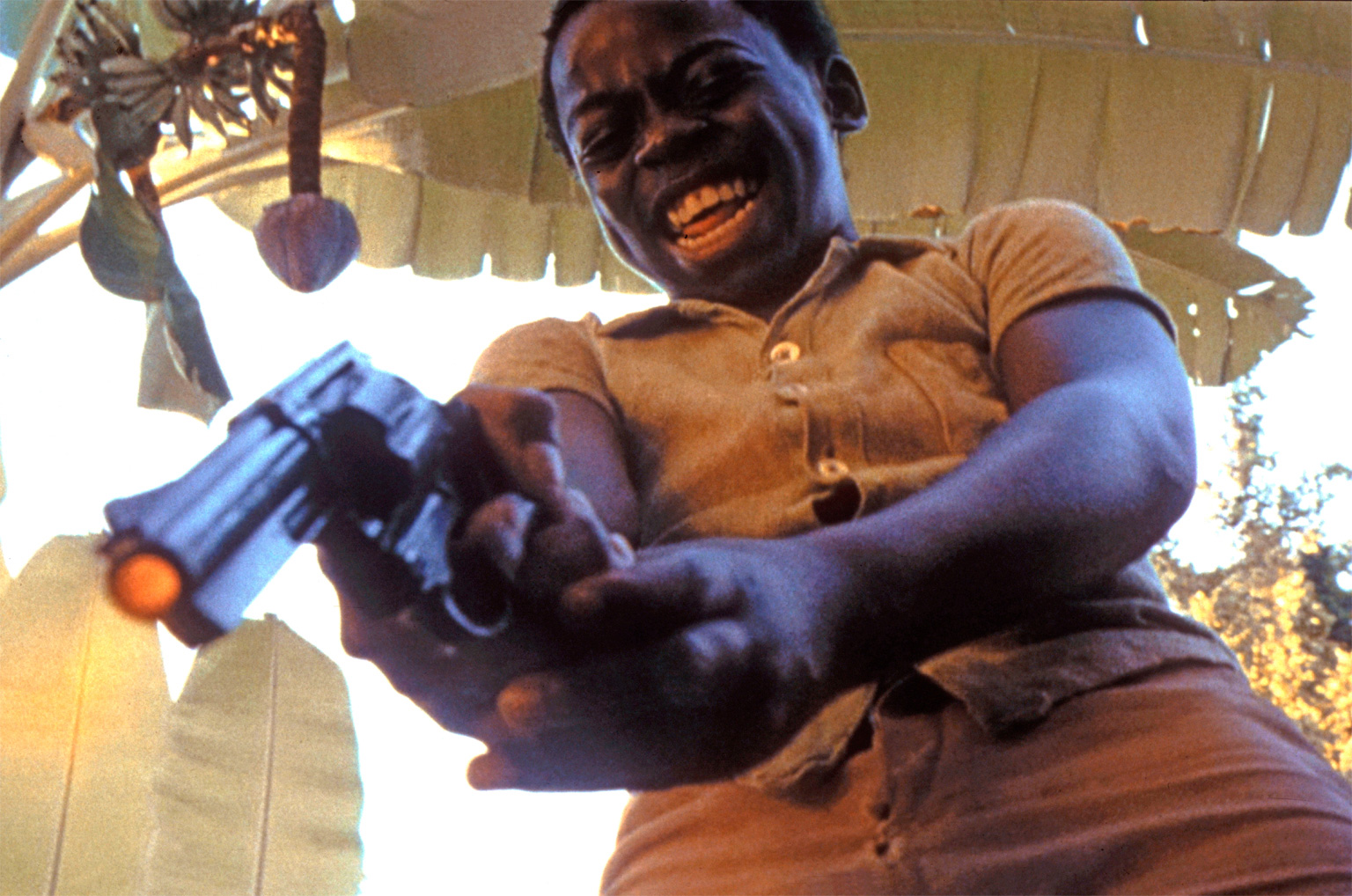
Dadinho, or Li’l Dice, (Douglas Silva) is the psychotic kid whose criminal career takes off after he massacres the inhabitants of a motel during a robbery.
“A kid? I smoke, I snort. I’ve killed and robbed. I’m a real man.”
Steak-with-fries / City of God
The city as fate
One of the main themes Meirelles explores is the favela’s corrosive effect on everyone it touches. The violence it spawns does not simply stay among the criminals, but rather is all consuming and perpetuates a culture of suffering for all the inhabitants. Meirelles presents the City of God as an entity in itself, a place that allows the wicked to thrive and the innocent to perish. This is demonstrated starkly in the movie’s opening sequence, in which two chickens are about to be plucked and cooked by Li’l Zé’s gang. A knife flashes as it is sharpened against a rock. One chicken flinches as the other is killed, and makes a break for it, but there is no escape.
When Knockout Ned tries to draw a line between being a hoodlum and his noble vigilante mission against Li’l Zé, the City of God intervenes, just as it does when Shaggy tries to flee the criminal life in the name of love, or when Benny decides that he’s too good a person to be a gangster. Each time a character gives in to their better nature, that character is punished. They are protagonists in their own Greek tragedies, with the city in the role of Fate.
"The sacrificial chicken conveys with the force of a blunt instrument how cheap life has become in the ghetto."
Peter Bradshaw
The Guardian
Journalistic ethics
City of God is a gangster story, an impassioned piece of social commentary, and an ambitious work of visual cinema. Rocket’s role as a photographer also allows the movie to touch upon the ethics of journalism in a war zone, or in this case, the act of dramatizing very real problems of poverty and violence. This is highlighted when Rocket confronts a newspaper for publishing without his permission the pictures he took of Li’l Zé. Rocket is sure that this has placed his life in danger, but from the paper’s perspective, the story comes first. As it turns out, Li’l Zé is delighted by the publicity, and his battle with Knockout Ned is played out in full media glare. The newspaper staff manipulate Rocket into taking more pictures in the war zones of the City of God, and the tensions between the desire to highlight social problems to sell papers and compassion for those involved in the stories told to do so are never totally resolved.
"Breathtaking and terrifying, urgently involved with its characters, it announces a new director of great gifts and passions: Fernando Meirelles. Remember the name."
Roger Ebert
Actors from the favela
The majority of the cast for City of God were not professional actors. As the director explained, at the time there simply were not enough black actors in Brazil to make this kind of movie. Two years before filming, Meirelles set up a workshop in the favela to train a group of around 100 amateur actors. The cast of City of God was drawn from this pool of talent. Over the course of several months, they developed scripts through improvisation sessions. The social commitment continued after filming ended as the actors received ongoing help to build new lives for themselves.
“Why return to the City of God, where God forgets about you?”
Stringy / City of God
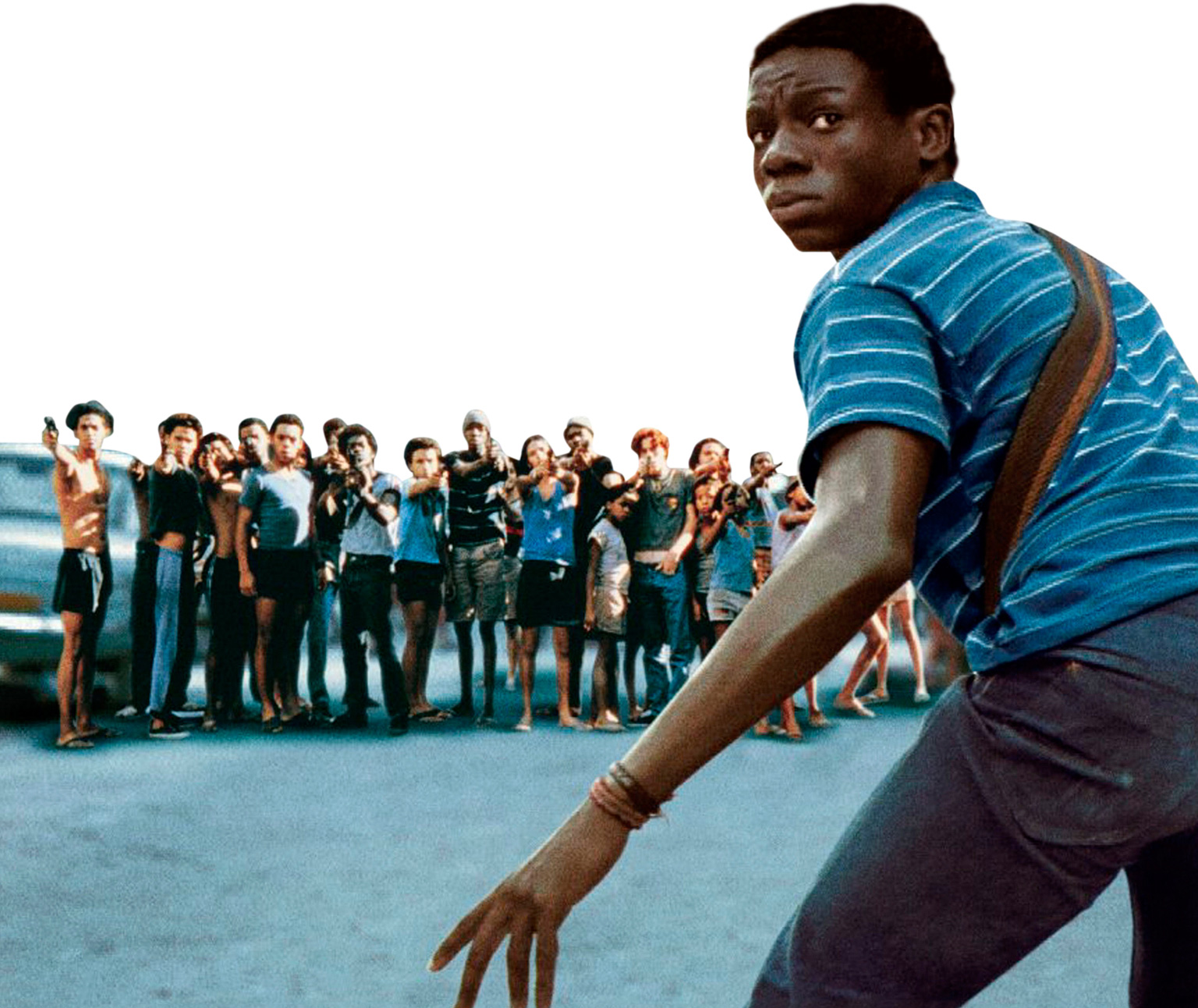
Police corruption and rampant drug dealing lead to gang wars in the City of God, where Rocket finds himself caught in the middle.
FERNANDO MEIRELLES Director
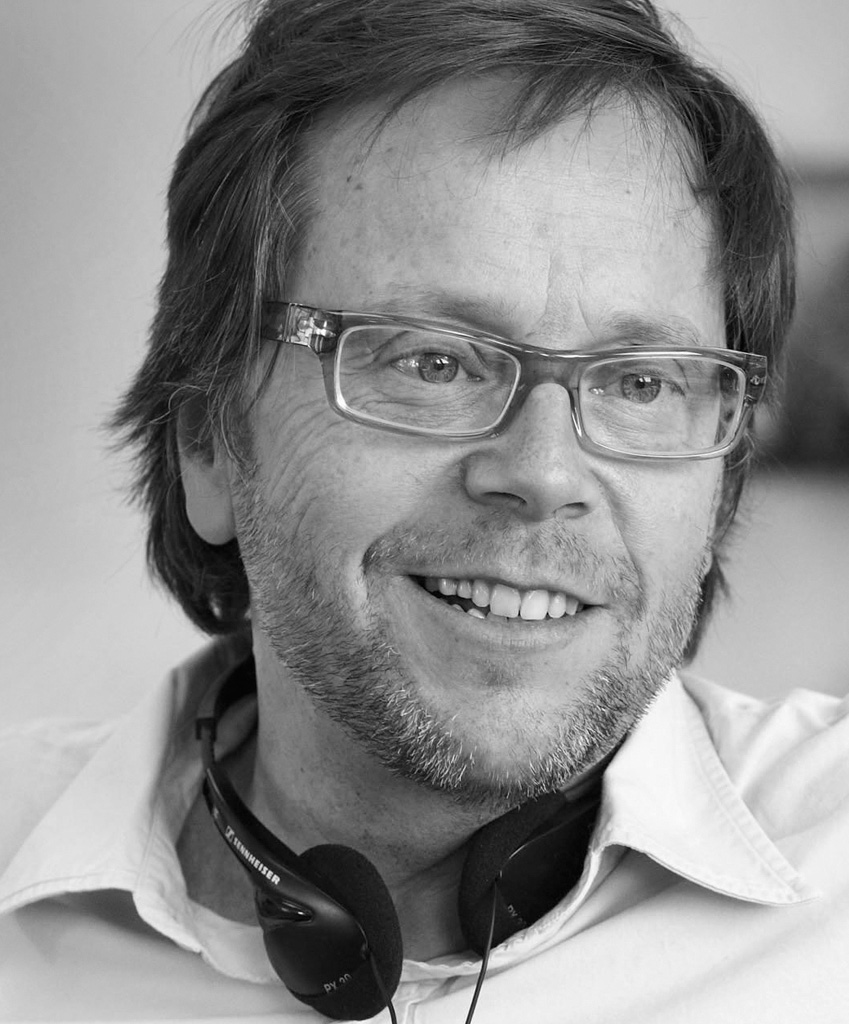
Born to a middle-class family in São Paolo, Brazil, in 1955, Fernando Meirelles studied architecture before winning several awards at Brazilian film festivals with his early shorts. He went on to find success in Brazilian television, most notably the children’s show Rá-Tim Bum. His first feature was a children’s movie, The Nutty Boy 2 in 1998. He made his name nationally in 2001 with the comedy Maids, and internationally a year later with City of God, which earned him an Oscar nomination for Best Director. Since then, he had further critical successes with The Constant Gardener and Blindness, for which he was nominated for the Palme d’Or.
Key movies
2001 Maids
2002 City of God
2005 The Constant Gardener
2008 Blindness
What else to watch: Goodfellas (1990) ✵ Casino (1995) ✵ Bus 174 (2002) ✵ The Constant Gardener (2005) ✵ City of Men (2007) ✵ A Prophet (2009)